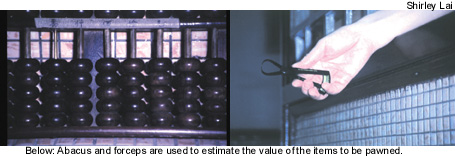
| Also featuring: | Alice Mak Ka-pik |
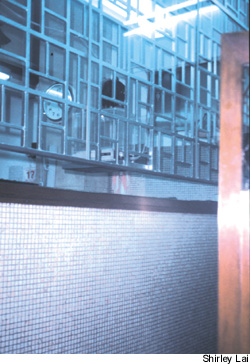 Working
behind a teller’s cage, a pawnbroker makes a mysterious impression
on visitors.
Working
behind a teller’s cage, a pawnbroker makes a mysterious impression
on visitors.
It has something to do with the pawnbroker’s inscrutable manner. In fact, in Hong Kong, pawnbrokers have to be mysterious and inscrutable.
Mr. Winston Fong (not his real name) is 49 and has been a pawnbroker for 26 years. He refused to be photographed.
“One of my colleagues was kidnapped after his name appeared on a magazine,” said Mr. Fong.
Yee suk kung — Cantonese slang for pawnbroker — describes a person who is licenced to lend money in exchange for valuable articles.
“I don’t know the origin of the expression, but when people come to the shop, they just say, ‘Yee suk kung, how much is this worth?’” said he.
It was his elder brother, also a pawnbroker, introduced to the field.
“It is rare for outsiders to enter this field unless you know some relatives or friends who also work in the profession,” said he.
As in other careers, new employees start as trainees.
Said Mr. Fong: “Two decades ago, trainees were just 12 or 13 years old. Even though they had no salary, they were willing to take the job.
The trainees had to do all the menial work — sweeping the floors, cleaning clothes and emptying spittoons used by senior staff. The trainees had to address them as masters.
There are no special requirements for someone to be a pawnbroker.
Mr. Fong said that a pawnbroker need not be excellent at mathematics.
Said he: “All you need are basic skills in writing and reading.
“The vocabulary range for writing the pawnbroker tickets is only 100 to 200 characters.”
However, there are still many skills required and jargon to be learnt.
Said Mr. Fong: “A master will teach you in case you do not understand.
“People working in this field are very class-conscious. It is not the duty for the senior staff to teach you the skills.
“My master once said to me, ‘Be committed and fulfil your duty’.
“For me, I studied how to write pawnbroker tickets for nearly 6 months. Later, I learnt how to use a balance and calculate with an abacus.
“I also had to memorise interest rates.”
His master also taught him how to produce a checklist that contained interest rates.
“I found using the checklist far more convenient for calculating interest,” said he.
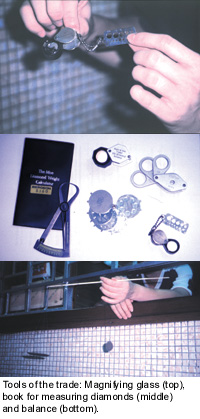 There
are several different jobs in a pawnbroker’s shop.
There
are several different jobs in a pawnbroker’s shop.
People working at the counter are senior staff. They are the so-called yee suk kung.
Those who work below the counter are responsible for simple clerical work.
The highest position is a supervisor, who is usually not in the shop.
Mr. Fong said, “It is possible to work for over 10 years and still work below the counter.”
In the past, running a pawnshop was a family business. Nowadays, it is common to run a shop as a partnership.
“An owner can have shares in more than one shop in the same or different districts.
“I have worked for three bosses and now this is the third one.
“The old shops were located at Tai Kok Tsui, Kwun Tong, Tsz Wan Shan and Sham Shui Po.
“Some were closed down and some are still running,” said Mr. Fong.
Mr. Fong is now working for Taylor Pawnshop at Yau Ma Tei. He has been there 17 years.
Over the years, he has thought of quitting because the job is boring.
“When I was still sitting below the counter, there was not much work to do,” said he.
Lack of any social life is another problem.
In the old days, most of the staff were required to live in the pawnshop for security reasons.
“We were not allowed to go out. We had to stay in the hostel for at least 5 days a week,” said he.
When it happened that one pawnshop he worked in was closed down, Mr. Fong almost decided to find a new job.
“I’ve got a driving licence, so I applied for a job driving a van.”
However, he gave up the idea because, although he could have earned more money as a driver, the accommodation and meals provided by the pawnshop helped him to save money.
In the old days, a pawnshop was often a building of 2 to 3 storeys.
The ground floor was for serving customers.
The first floor was used as a warehouse for storing sizable items like clothes and cotton quilts.
The hostel was on the top floor.
Nowadays, however, no staff live in the shop.
“There are now only two to three staff in a pawnshop compared with eight to 10 two decades ago,” said Mr. Fong.
Modern pawnshops are usually small shops. The big wooden screens engraved with the names of the pawnshops are the stores’ trademarks.
“The screen is for the customer to hide behind,” said he. “People generally feel ashamed to visit a pawnshop.”
By exchanging valuables with a pawnbroker, the customer can receive a short loan.
The loan is approximately half of the original price of the valuables.
One can redeem the item by paying back the loan with the interest.
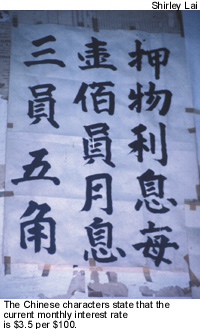 The current
monthly interest rate is $3.5 per $100. Normally items must be redeemed
within four months on the lunar calendar.
The current
monthly interest rate is $3.5 per $100. Normally items must be redeemed
within four months on the lunar calendar.
According to Mr. Fong, in the past they accepted items like clothes and cotton quilts, which were worth only $5.
Nowadays, they do not accept such items because they are too bulky and are not worth much.
“Jewellery is generally accepted these days,” said he.
“In the old day, some parents would pawn their valuables to pay for their children’s uniforms and books,” said he.
“Today, people from all walks of life pawn, mostly gamblers. Some of them are frequent visitors. There have also been some Filipino maids in recent years.”
When asked if clients bargain with him for higher prices, he said that clients could choose not to accept the set price.
“But usually we can reach a compromise easily,” said he.
Mr. Fong said pawnshops possess a set of tools for estimating the value of objects to be pawned.
Some tools have been modernised.
Said Mr. Fong: “We used a balance with a pan and a weight in the past. We now use an electronic balance.”
Even though they have equipment, mistakes cannot be avoided.
“We have incorrectly accepted fake items, such as fake gold and watches,” said he.
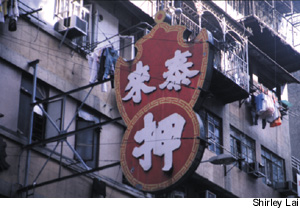 Mr. Fong
said that in this case the supervisor would not blame the staff.
Mr. Fong
said that in this case the supervisor would not blame the staff.
“The boss also works in this profession. He realises that there are really people who attempt to cheat us.”
That is why a pawnshop does not accept antiques or old paintings.
“It is difficult to tell whether antiques are real or not,” said he.
He pointed out that a pawnbroker should not speak too highly of himself. Being humble is a key to success.
“When I was still sitting below the counter, a senior pawnbroker said that he had never accepted fake jewellery.
“At the moment he was saying this, he picked up a necklace and it broke immediately into pieces,” said he.
Mr. Fong said that he had never regretted being a pawnbroker.
“A job is a job. I can’t say if I like this job or not. I’m
not an ambitious person. I just want to have a stable life,” said
he.![]()
